
16 Days Southwest Yunnan Ancient Tea Culture Tour from Jinghong to Lijiang
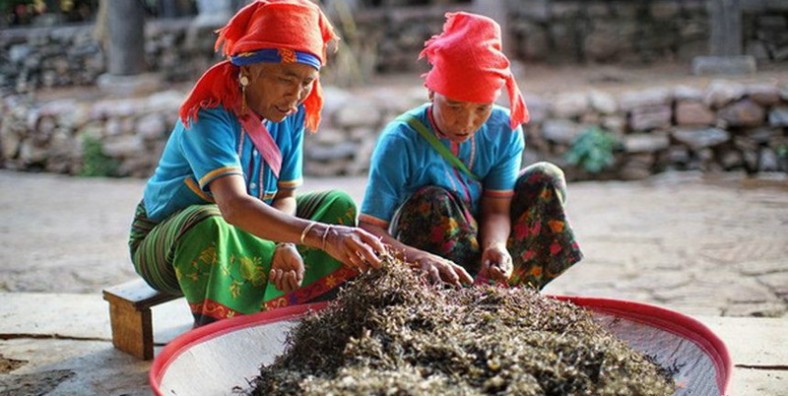
Tour Overview
Dianhong Black Tea and Puer Tea are two famous teas in Yunnan Province and China. So to experience the Puer Tea and Dianhong Black Tea culture is an unique...
Length of Travel: 16 Day
Destinations of Tour: Kunming-Yuxi-Zhenyuan-Puer-Jinghong-Mengla-Jinghong-Menghai-Lancang-Menglian-Ximeng-Shuangjiang-Lincang-Yunxian-Fengqing-Nanjian-Weishan-Dali--Lijiang
Departure City: Kunming
Price of Tour: Request
Type of Tour:
Features of Tour:
Dianhong Black Tea and Puer Tea are two famous teas in Yunnan Province and China. So to experience the Puer Tea and Dianhong Black Tea culture is an unique and special activity in Yunnan tour. The mysterious tea culture in Yunnan will make your tour memorable. 16 days tour prolongs your tea culture trip so that you can have enough time to visit the most famous tea plantations, tea factories and learn more about the history, development and tea-making process of Dianhong Black tea and Puer tea.
Highlights:
- Experience the local life and ethnic culture.
- Appreaciate the charming landscape.
- Visit the charming destinations of tea production featuring diversified traditions saturated with tea elements.
Brief Itinerary
- Day 1: Kunming Arrival
- Day 2: Kunming-Yuxi-Zhenyuan-Jiujia Town
- Day 3: Jiujia Town-Zhenyuan-Puer
- Day 4: Puer-Zhengdong Town-Yiwu Town
- Day 5: Yiwu
- Day 6:Yiwu-Menglun-Jinghong
- Day 7: Jinghong-Menghai-Jingmai
- Day 8: Jingmai
- Day 9: Jingmai-Ximeng
- Day 10: Ximeng-Shuangjiang
- Day 11: Shuangjiang-Lincang
- Day 12: Lincang-Yunxian-Fengqing
- Day 13: Fengqing-Xiaowan-Dali
- Day 14: Dali
- Day 15: Dali-Lijiang
- Day 16: Lijiang Departure
Google Map
Detailed Itinerary
Day 1 Arrive in Kunming
Sightseeing and Activities:Arrive in Kunming, Green Lake Park, Welcome Dinner
Accommodation: Kunming
Meals: None
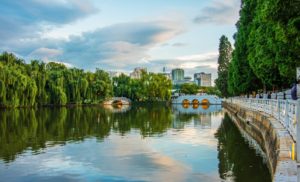
You’ll begin your journey to the diverse and captivating province of Yunnan from the capital city, Kunming. Upon arrival at the Kunming International Airport, meet your local guide and transfer to the hotel. And then, you will take a leisurely stroll along the Green Lake, a charming area of teahouses and small boutiques selling handicrafts and beautiful local paintings.
Enjoy welcoming dinner of Yunnan Flavouring food with crossing Bridge Rice Noodle and Steam Pot Chicken/Qiguoji.
— Kunming is the capital of southwest China’s Yunnan province, a primarily agricultural province of 45 million. Kunming has a population of five million and is located in one of the world’s most geographically, ethnically, biologically and linguistically diverse regions. Situated at 1,900 meters (6,233ft) above sea level and 25° north of the Equator it has a rather unique and pleasant climate for a Chinese city.
Day 2 Kunming-Yuxi-Zhenyuan-Jiujia Town
Sightseeing and Activities: Dai Ethnic Village, Arrive at Jiujia Town
Accommodation: Jiujia Town
Meals: Breakfast, lunch
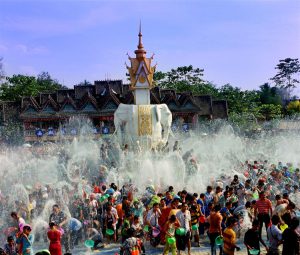
After breakfast, you will have a beautiful driving about 380 kilometers to Jiujia Town of Zhenyuan County. Drive around 5 hours from Kunming to Jiasa Town in Xinping Yi and Dai Autonomous County. Have lunch with Dai ethnic flavor in Jiasa Town.
Jiasa(嘎洒 in Chinese) is a small town in Xinping County, Yunnan Province. ‘Jiasa’ in Dai language means the street near the beach. Yuanjiang River flows beside the town and brought it fertile land and warm weather. Jiasa is famous for its special minorty group, Huayao Dai. It is a branch of Dai People, and keeps its own features. Huayao Dai People don’t live in the bamboo buildings as Dai People do, they live in a speicla kind of cottage called ÍÁÕÆ·¿(house made of soil). Women wear tattoos on their arms, and they like chewing pinang to dye their teeth black. Tattoos and black teeth are the simble of beauty in traditional Huayao Dai women’s eyes.
After lunch, continue the driving to Zhenyuan Yi, Hani and Lahu Autonomous County. It is 80 Kilometers driving from the downtown to Jiujia Town where you will visit the Qianjiazhai Ancient Tea Trees Growing Area in Ailaoshan Mountain Nature Reserve.
Day 3 Jiujia Town-Zhenyuan-Puer
Sightseeing and Activities: Qianjiazhai Ancient Tea Plantation
Accommodation: Puer
Meals: Breakfast, lunch
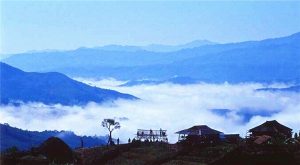
Visit the Qianjiazhai Ancient Tea Trees Growing Area in Ailaoshan Mountain Nature Reserve in the morning; then drive to Puer City.
–Qianjiazhai Ancient Tea Growing Area is located in Jiujia Town of Zhenyuan Yi, Hani, and Lahu autonomous county in Puer City. It lies in the western part of Puerh City and the middle section of the southwestern Yunnan Ailao and Wuliang mountain chains. Within the area’s border is a string of mountains. In fact, mountainous terrain makes up 97.7% of the land. The total area of Zhenyuan County is 4,109.38 km2. The topography is complex, high in the north and lower in the south. The highest point is 3,137 meters above sea level, while the lowest is 774 meters. The county seat of Enle lies at an elevation of 1,080 meters.
Zhenyuan has a subtropical climate, with a yearly average temperature of 18.5°C, 1,284.8mm of annual rainfall, and an average relative humidity of 78%. The Babian, Amo, and Mengtong rivers flow through the area. It was an important stopping point on the Old Tea Horse Road. In 1990, Zhenyuan Yi, Hani, and Lahu Autonomous County was formed.
In 1998, county-level administrative offices were moved from the town of Anban to Enle. The Jiujia township village of Qianjia contains a record in the Guinness Book of World Records for a 2700+-year-old, world tea tree king. This has become one of Zhenyuan’s main tourist attractions.
–Puer City
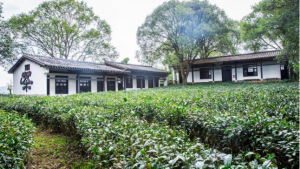
Situated in the northwest of Yunnan Province, Puer has an important location in China’s southwestern boundary, neighboring Laos, Vietnam and Burma and sharing a 486 kilometers (302 miles) boundary line with these three countries. Kunming is about 550 kilometers (342 miles) from Puer.
Puer is in an important location linking roadway and waterway transportation between the China hinterland and Southeast Asia. Since 1896, it has been opened up as a commerce port, being one of the three towns of trading importance in Yunnan. Puer City was originally called,’Simao City’ and, is famous for its Puer Tea.
Puer consists of many ethnic minorities, such as Lahu, Hani, Wa and Yi. Varied customs make it a colorful city. Eating habits, ceremonies, costumes and folk legends can all be a strong attraction for people who are visiting. In addition, Puer City is the hometown of the well known Puer Tea, and Puer people have diversified ways of handling tea, such as bamboo tube tea, cold tea dish, earth-pot tea and baked tea; all of which you should try.
Day 4 Puer-Zhengdong Town-Yiwu Town
Sightseeing and Activities: Puer Tea Plantation, Puer tea factory
Accommodation: Yiwu
Meals: Breakfast, lunch
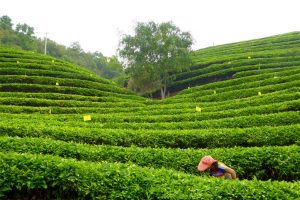 In the morning,drive up to Puer Tea Gardens, overlooking Puer City where Austin was interviewed by the media. You will explore the Chinese Tea Institute and their library of dried tea leaves before being whisked off to a tea tasting and more interviews.
In the morning,drive up to Puer Tea Gardens, overlooking Puer City where Austin was interviewed by the media. You will explore the Chinese Tea Institute and their library of dried tea leaves before being whisked off to a tea tasting and more interviews.Visit the Puer tea factory and experience how local people cook the Puer tea cakes.
In the afternoon, drive to Zhendong Town and visit Zhengdong Sansai Villages of Dai ethnic people.
Continue the driving to Yiwu Town for overnight.
Day 5 Yiwu Town
Sightseeing and Activities: Puer Tea Plantation, Puer tea factory, Yiwu Village, Tea Workshops
Accommodation: Yiwu
Meals: Breakfast, lunch
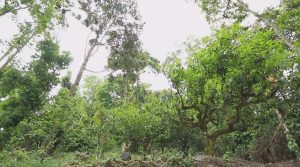
Take a bumpy dirt road to see an 800yr old tea tree overlooking a gorgeous lush valley in Zhengshan Mountain. On the way back you walk along the Tea Horse Trail which begins in Yiwu village and goes all the way to Tibet.
Our next stop is He Tian Neng’s old tea workshop where you drink tea and see the stone blocks used to press tea cakes. Mr. He then will take you to his newer workshop where you watch as workers make puer tea cakes by hand using the following method:
Full tea leaves and buds (2 leaves to 1 bud) are picked and collected in baskets.
The leaves are spread out on woven trays and dried in the sun for several hours.
Once dried the leaves are steamed under low heat for about 30 seconds to bring the moisture back and make the leaves pliable.
The moist leaves are wrapped in a cloth and pressed by hand into a disc shape.
A heavy stone press is then placed on top of the tea cake and a worker stands on top of this press, rotating his wade in a circular motion for about a minute.
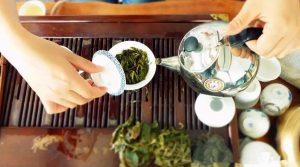
In about 10 minutes the stone press is removed and the cloth covered cake is moved to a shelf for drying.
After 6hrs or so the cloth is removed from the tea cake and it may be wrapped in tea paper.
Puer tea cakes may be used to make tea immediately, however because the leaves have not been cooked they will continue to oxidize over time and will mature into a deep rich flavor in 5-10 years.
Yiwu is one of the 6 famous puer tea mountains and home to a puer tea museum which we visited along with the start of the Tea Horse Trail. In the evening you hang out in the small Yiwu Village, have tea and beer in front a shop and fired off roman candles in the street. Glenn fired an errant shot, narrowly missed Kevin’s head, before we retired to our slightly rough accommodations for the night.
Day 6 Yiwu Town-Menglun-Jinghong
Sightseeing and Activities: Menglun Tropical Garden
Accommodation: Jinghong
Meals: Breakfast, lunch
After a noodle breakfast, drive to visit Menglun Tropical Botanical Garden. Situated 103 kilometers, or 3 hour ride, from Jinghong, the Tropical Botanical Garden was founded in 1958 and is currently playing an important role in research in the areas of medicinal plants, taxonomy, economic plants and biochemistry. This garden proudly holds 3,000 species of plants, one of the richest botanical concentrations all over the world.
After visiting Menglun Tropical Botanical Garden, drive along a winding road through a tropical rain forest and stopped briefly at a rubber tree orchard on the way to Jinghong.
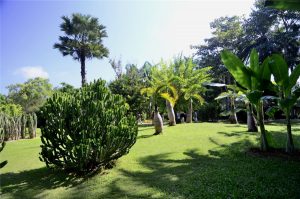
Day 7 Jinghong-Menghai-Jingmai
Sightseeing and Activities: Nannuo Tea Mountain, Yunnan Tea Research Institute, Jinzheng Octagonal Pavilion, Huimin Town
Accommodation: Jingmai
Meals: Breakfast, lunch
Drive to Menghai County, visit Nannuo Mountain Tea Plantation and Yunnan Tea Research Institute. Nanuo is one of six tea Mountains, the origin of tea of the world, today we will visit a tea plantation with history of over 600 years old.
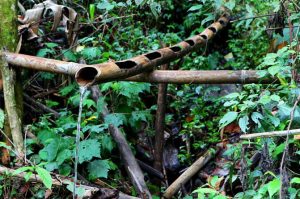 At Yunnan Tea Research Institute, we will be given a lecture on Yunnan minority tea culture while enjoy the tea performance of courses of Flaming Tea from Ai’Ni ethnic minority, cool mixed tea of Jinou, Earth-pot tea of La’hu and so on.
At Yunnan Tea Research Institute, we will be given a lecture on Yunnan minority tea culture while enjoy the tea performance of courses of Flaming Tea from Ai’Ni ethnic minority, cool mixed tea of Jinou, Earth-pot tea of La’hu and so on.
Visit Jinzheng Octagonal Pavilion, and then drive to Lancang Lahu Autonomous County. Transfer to Huimin Town which is 50 kilometers away from Lancang Lahu Autonomous County.
Day 8 Jingmai
Sightseeing and Activities: Jingmai and Mangjing Ancient Tea Mountain, Ethnic Villages
Accommodation: Jingmai
Meals: Breakfast, lunch
Get up in the early morning, visit Jingmai and Mangjing Ancient Tea Mountains in Huimin Town.
The Jingmai Mangjing Ancient Tea Association consists of 209 member households from two administrative villages, namely Jingmai and Mangjing, which are composed of six natural villages. Some of the poorest populations are often ethnic minorities in border regions where the Jingmai Mangjing Ancient Tea Association is located.
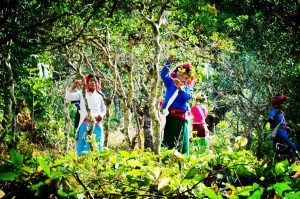
The popularity of ancient tea among Chinese tea drinkers has rapidly increased in recent years and can be produced in excellent quality from Jingmai and Mangjing’s tea trees. The number of leaves picked from ancient trees is currently 10 times higher than that of the fresh leaves picked from cultivated tea plants.
The Jingmai Mangjing Tea Association makes up most of the Jingmai Ancient Tea garden, which covers an area of 1600 ha, 910 ha of which are organic. The government has declared the Jingmai Ancient Tea Garden an important area for protection and began promoting ecotourism. The government also emphasizes organic management to increase the value of tea products.
Transfer to Menglian Dai, Lahu and Va Autonomous County and visit Nayun Ancient Town of Dai ethnic people.
–About Jingmai Ancient Puer Tea
Ancient Pu-erh tea tree, natural growing environment, organic tea leaves, picked in early spring season before rain, sundried Maocha, pressed with stone mode…the core value of traditional Pu-erh is consisted of all these factors. There are many famous ancient Pu-erh tea mountains located in Yunnan province, and every kind of ancient Pu-erh has its own unique flavor because of the different growing earth, weather, environment etc. in different mountains.
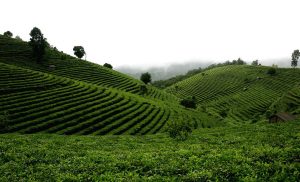
Awazon “Jinmai Ancient Tea” raw cake is made of pure ancient tea tree leaves from Jingmai ancient tea mountain. Only top grade early spring tea leaves and buds from over thousand year old ancient tea tree are used as raw material for making this raw Pu-erh tea cake. This is the best choice for Pu-erh connoisseurs and collectors.
Please note that only ancient Pu-erh tea can last over 15 infusions, which is a very important factor to judge if it’s real ancient Pu-erh or not. For this Awazon “Jinmai Ancient Tea”, the brewed liquor becomes much better from the 3rd infusion on. You will feel a very good sweet aftertaste in deep throat and full mouth with lingering orchid aroma. This is a unique flavor of ancient Pu-erh tea from Jingmai and Mangjing ancient tea tree. What surprising is this flavor will be getting stronger and better after years of aging. And this feature makes our Awazon “Jinmai Ancient Tea” raw Pu-erh tea cake much more valuable for collection.
Day 9 Jingmai-Ximeng County
Sightseeing and Activities: Ancient Tea Trees, Original Forest, Tea Factory
Accommodation: Ximeng
Meals: Breakfast, lunch
Drive one hour and a half to Ximeng County, visit the Ancient Tea group and the original forest in Fodianshan Mountain with 2458 meters above the sea level. There are 19.5 square kilometers ancient tea trees in Fodianshan Mountain, which is well-known as one of the 8 famous tea mountains in Puer City.
Visit local tea factory in the afternoon.
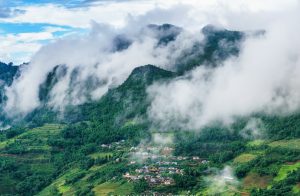
–The Va ethnic minority, with a population of 396,610, lives in Ximeng, Cangyuan, Menglian, Gengma, Lancang, Shuangjiang, Zhenkang and Yongde counties in southwestern Yunnan Province. Some are found scattered in the Xishuangbanna Dai Autonomous Prefecture and the Dehong Dai-Jingpo Autonomous Prefecture. Ximeng and Cangyuan counties are the main places where the Va people live in compact communities. In the areas where the Va people live, there are also Hans, Yis, Dais, Hanis, Lahus, Jingpos, Blangs, De’angs and Lisus.
Ximeng, Cangyuan, Menglian and Langcang are situated between the Lancang and Nu rivers, blocked by undulating mountain ridges some 2,000 meters above sea level. Traditionally this area was called the Ava hilly region.
With a subtropical climate, the fertile Ava region has plentiful rainfall and only 40 frost-free days a year. It is suitable for the growth of dry rice, paddy, maize, millet, buckwheat, potatoes, cotton, hemp, tobacco and sugarcane, as well as such subtropical fruits as bananas, pineapples, mangoes, papayas and oranges.
Optional Day tour in Ximeng County:
Tour include Fodianshan Mountain Ancient Tea Forest, Dragon Pool, Likan Waterfalls and Wa ethnic villages.
Day 10 Ximeng County-Shuangjiang
Sightseeing and Activities: Mengsuo Dragon Pool and Wa ethnic villages, Ancient Tea Trees
Accommodation: Shuangjiang
Meals: Breakfast, lunch
Visit the Mengsuo Dragon Pool and Wa ethnic villages in the morning;
A long but nice driving from Ximeng County to Lincang City via Shuangjiang County. Visit The 10, 000 Acres Wild Ancient Tea Trees in Shuangjiang County.
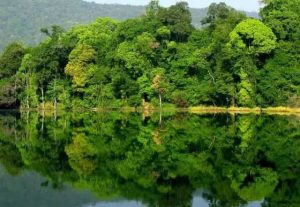
One day Optional tea tour to Bingdao Village and visit the ancient tea trees as well as the Mengku Tea Factory in Mengku Town.
It is aournd 50KM from Mengku Town to Bingdao Village, take a local minibus to the village from a bumpy road, then trek to the village. Bingdao(±ùµº) , a small and poor Luhu ethnic village surrounded by green mountains which is the origin of the tea plantation in China. You can see several ancient tea trees around the village as well as the Lahu ethnic people with colorful costumes. Visit Bingdao Elementary School, exchange the culture with local ethnic students, prepare some gifts to these children. Cross the school, you will find some huge ancient tea trees with more than 2000 years old.
–Mengku Daxueshan Virgin Forest and the Ancient Tea Trees
The 10, 000 Acres Wild Ancient Tea Trees Garden is located in Mengku Town (Û¿âÏç) in Shuangjiang County. The wood has a total area of 12, 000 acres and a history of more than 2,500 years. Home to over 80, 000 ancient wild tea trees, it is the largest, oldest and highest tea trees wood ever found in this planet.
Day 11 Ximeng County-Shuangjiang-Lincang
Sightseeing and Activities: Lincang Tea Culture and Customs Garden and Lincang tea factories
Accommodation: Lincang
Meals: Breakfast, lunch
Visit Lincang Tea Culture and Customs Garden and Lincang tea factories.
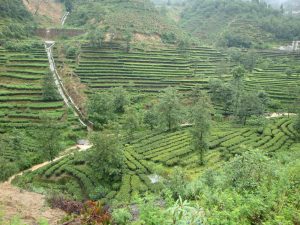 –Lincang Tea Culture and Customs Garden
–Lincang Tea Culture and Customs GardenLying in the suburb of the Lin Xian g District, the 110 hectare scenic zone is one of the 25 most heated tourist destinations of Yunnan Province. It is an all-around man-made tourist zone for sightseeing, leisure, recreation and cultural exploration. Wandering in the tea garden, one can not only learn the far – reaching Chinese Tea culture and tradition but also take part in the whole process of preparing tea. In the mean time one will be exposed to the
–Lincang City is a prefecture-level city,With Lancang ( Mekong ) River to the east, Lincang region is located in the Southwest of Yunnan. It borders Myanmar and includes eight counties, including the only two Wa Autonomous Counties in Yunnan — Cangyuan and Ximeng, occupying 50% of the total population of Wa nationality in Yunnan.
Day 12 Lincang-Yunxian-Fengqing
Sightseeing and Activities: Dianhong Black Tea Factory,
Accommodation: Fengqing
Meals: Breakfast, lunch
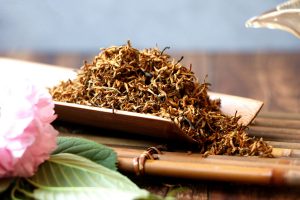 Drive to Fengqing County via Yunxian County in the morning. Visit Dianhong Black Tea Company, tea factories and tea plantation in Fengshan Town.
Drive to Fengqing County via Yunxian County in the morning. Visit Dianhong Black Tea Company, tea factories and tea plantation in Fengshan Town.
Day 13 Fengqing-Xiaowan-Dali
Sightseeing and Activities: Ancient Tea Trees, Ethnic Villages
Accommodation: Fengqing
Meals: Breakfast, lunch
Drive to Xiaowan to visit an ancient tea trees. On the way back to Dali, visit some ethnic villages.
Day 14 Dali
Sightseeing and Activities: Xizhou Old Town, Zhoucheng Village, Three Pagodas
Accommodation: Dali
Meals: Breakfast, lunch
In the morning, head for Xizhou Town to fully appreciate Bai-style traditional architectural courtyards, taste their fragrant Three-Course Tea and explore their distinctive culture.
Transfer to visit Zhoucheng Village and the Bai people’s Tie-dying cloth workshop where you can take some special souvenir with the Bai ethnic style.
Then visit Three Pagodas in Chongshen Monastery which has a history of over 1,800 years located at the foot of Cangshan Mountain facing to the Erhai Lake. Three Pagodas are made of three ancient independent pagodas forming a symmetrical triangle.
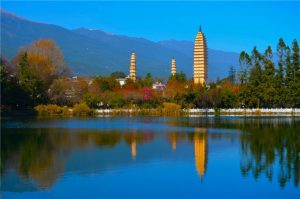
Day 15 Dali-Lijiang
Sightseeing and Activities: Lijiang Old Town, Black Dragon Pool, Dongba Culture Museum
Accommodation: Lijiang
Meals: Breakfast, lunch
Drive to Lijiang. Transfer to Dongba Culture Museum where more than 10,000 Dongba cultural relics show mysterious Dongba culture of the Naxi people. Take a gentle walk to Black Dragon Pool Park to enjoy gorgeous view and peaceful surroundings. If weather permits, get to the best spot to overlook the snow-capped Jade Dragon Snow Mountain and shoot some amazing pictures.
Day 16 Lijiang Departure
Sightseeing and Activities: Lijiang Departure
Accommodation: none
Meals: Breakfast
Departure from Lijiang.
Service Included:
- Admission fees for all of the sightseeing spots listed in the itinerary;
- Meals as listed in the itinerary;
- Hotels as listed in the itinerary;
- Private English-speaking tour guide and vehicle for transfers & sightseeing;
- Service charge & government taxes;
- Luggage transfers between airports and hotels;
- Free-bottled mineral water;
Service Excluded:
- Any arrival and departure international airfares or train tickets;
- Chinese visa fees;
- Tips to guides and drivers;
- Personal expenses and gratuities to service staff.
- Personal travel accident insurance;
- All optional programs.

 7 Days GolfingTour
7 Days GolfingTour
 8 Days Group Tour
8 Days Group Tour
 8 Days Yunnan Tour
8 Days Yunnan Tour
 7 Days Shangri La Hiking
7 Days Shangri La Hiking
 11 Days Yunnan Tour
11 Days Yunnan Tour
 6 Days Yuanyang Terraces
6 Days Yuanyang Terraces
 11 Days Yunnan Tour
11 Days Yunnan Tour
 8 Days South Yunnan
8 Days South Yunnan
 7 Days Tea Tour
7 Days Tea Tour
 8 Days Muslim Tour
8 Days Muslim Tour
 12 Days Self-Driving
12 Days Self-Driving
 4 Days Haba Climbing
4 Days Haba Climbing
 Tiger Leaping Gorge
Tiger Leaping Gorge
 Stone Forest
Stone Forest
 Yunnan-Tibet
Yunnan-Tibet
 Hani Rice Terraces
Hani Rice Terraces
 Kunming
Kunming
 Lijiang
Lijiang
 Shangri-la
Shangri-la
 Dali
Dali
 XishuangBanna
XishuangBanna
 Honghe
Honghe
 Kunming
Kunming
 Lijiang
Lijiang
 Shangri-la
Shangri-la
 Yuanyang Rice Terraces
Yuanyang Rice Terraces
 Nujiang
Nujiang
 XishuangBanna
XishuangBanna
 Spring City Golf
Spring City Golf
 Snow Mountain Golf
Snow Mountain Golf
 Stone Mountain Golf
Stone Mountain Golf

















